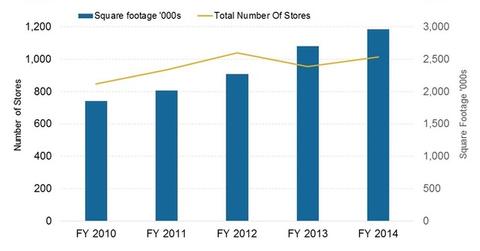Coach’s Pricing Strategies And Target Market
Coach’s pricing is lower than other luxury brands. This appeals to HENRYs, or high-earners, not rich yet, among other markets.
Jan. 19 2015, Updated 10:51 a.m. ET

Coach’s target market
Coach (COH) products are part of the luxury goods market. Luxury consumers typically fall into certain categories, mostly according to level of affluence and age bracket.
Coach offers quality products that are considered affordable luxuries. Coach is one of the pioneers of the affordable luxury industry. While handbags often retail at prices of over $1,000 at LVMH (MC.PA) (LVMUY), Hermes (RMS.PA), Burberry (BRBY.L) (BURBY), or Prada (PRDSY.PK), Coach’s price points are much lower, generally ranging between $100 and $500 dollars. Major competitors at these price points include Michael Kors (KORS), Ralph Lauren (RL), Tory Burch, Marc by Marc Jacobs, and Kate Spade (KATE).
Footwear pricing
Similarly, Coach’s pricing is also lower than other luxury brand footwear products. Top-end brands such as Jimmy Choo (CHOO.L), Steve Madden, and Manolo Blahnik sell footwear at prices of over $500 a pair. Coach’s pricing for footwear typically falls between $50 and $300 a pair. That’s likely to change now for some categories with the company’s acquisition of premium footwear company Stuart Weitzman. This acquisition will be covered in Parts 16 and 17 of this series.
The same pricing principles apply for watches, eyewear, apparel, and other Coach products.
Coach products typically attract premium customers, aspirational luxury shoppers, or designer wannabes looking to step into the luxury market. Coach also appeals to shoppers that splurge on the occasional luxury purchase. The company also has a market in HENRYs, an acronym for high-earners, not rich yet.
Wholesale customer target market
As you discovered in Part 6 of this series, in its wholesale channels, Coach is responsible for creating a product assortment, including price points, consistent with the demand requirements of shoppers visiting the department stores. Coach has also implemented an automatic inventory replenishment system with major department store accounts.
Factory outlet customers
Factory outlets sell products that are outlet-specific, targeted toward value-oriented customers. Typically, the inventory at these outlets is older and is available at discounted prices. Outlet customers also typically spend less because the stores are located at a distance from major centers.
Policy changes
Pricing strategies at Coach are undergoing a shift. Read more about these changes in Part 16, which covers the company’s transformation plan.
